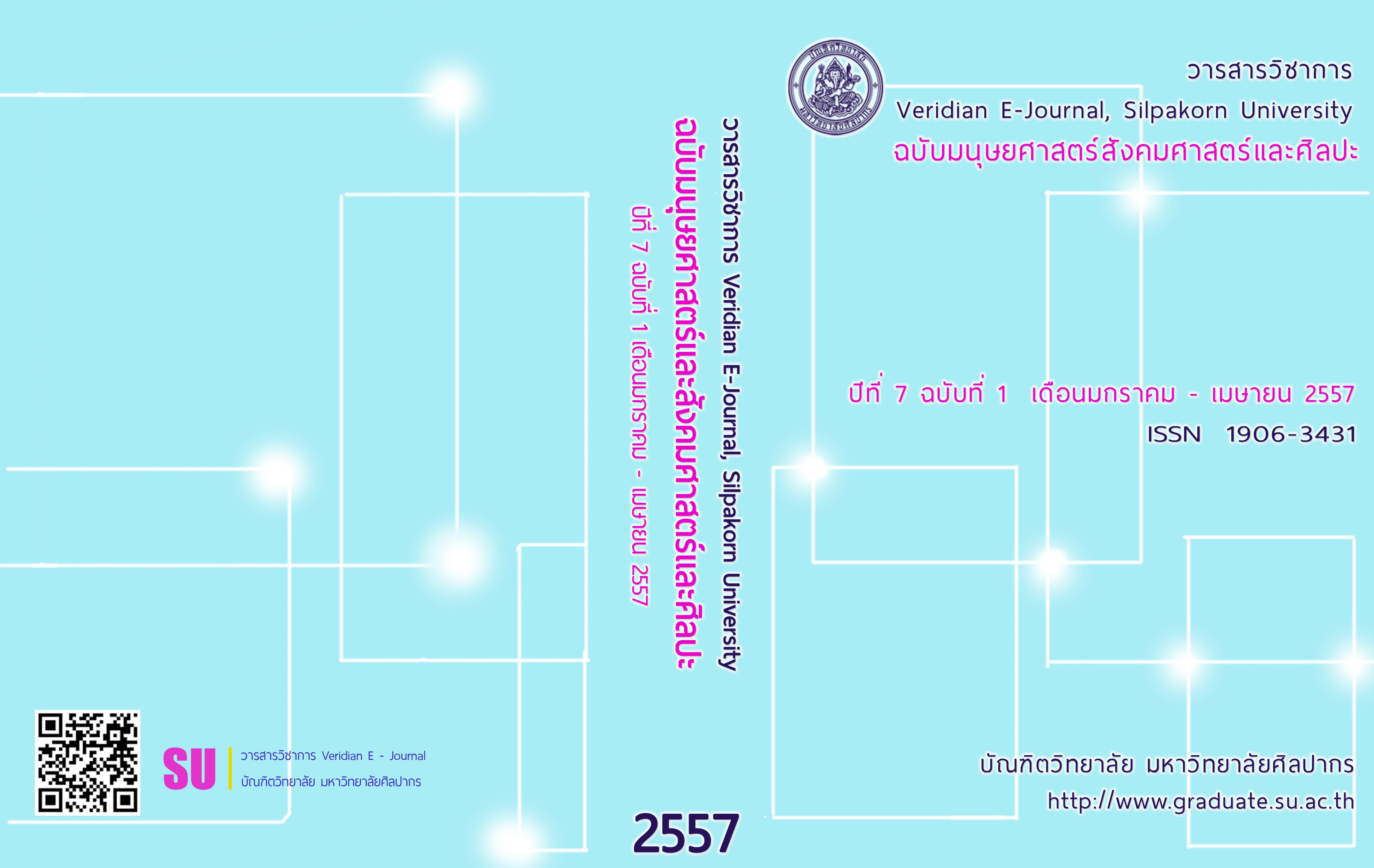การเปรียบเทียบผลสัมฤทธิ์ทางการเรียนภาษาอังกฤษและการคิดวิเคราะห์ของนักเรียนชั้นมัธยมศึกษาปีที่ 3 ระหว่างการจัดกิจกรรมด้วยกลุ่มร่วมมือแบบ CIRC และแบบมุ่งประสบการณ์ภาษา
Main Article Content
บทคัดย่อ
บทคัดย่อ
การจัดกิจกรรมด้วยกลุ่มร่วมมือแบบ CIRC และแบบมุ่งประสบการณ์ภาษา เป็นการจัดการเรียนรู้ที่ช่วยพัฒนาผลสัมฤทธิ์ทางการเรียนภาษาและทักษะอื่นๆ ซึ่งเน้นรูปแบบภาษาที่สามารถนำไปใช้ได้จริง มีขั้นตอนการจัดกิจกรรมการเรียนรู้ที่สามารถส่งเสริมความสามารถทางการคิดวิเคราะห์ได้ วิธีสอนทั้งสองวิธีนี้เป็นวิธีที่เหมาะกับการพัฒนาผลสัมฤทธิ์ทางการเรียนภาษาอังกฤษและความสามารถทางการคิดวิเคราะห์ได้ การวิจัยครั้งนี้มีความมุ่งหมายเพื่อ 1) ศึกษาประสิทธิภาพของแผนการจัดกิจกรรมด้วยกลุ่มร่วมมือแบบ CIRC และแผนการจัดกิจกรรมแบบมุ่งประสบการณ์ภาษา ตามเกณฑ์ 70/70 2) หาดัชนีประสิทธิผลของแผนการจัดกิจกรรมด้วยกลุ่มร่วมมือแบบ CIRC และแบบมุ่งประสบการณ์ภาษา และ 3) เปรียบเทียบผลสัมฤทธิ์ทางการเรียนวิชาภาษาอังกฤษและคิดวิเคราะห์ระหว่างการจัดกิจกรรมด้วยกลุ่มร่วมมือแบบ CIRC และแบบมุ่งประสบการณ์ภาษา กลุ่มตัวอย่าง คือ นักเรียนชั้นมัธยมศึกษาปีที่ 3 โรงเรียนสุรนารีวิทยา อำเภอเมือง จังหวัดนครราชสีมา ภาคเรียนที่ 1 ปีการศึกษา 2555 จำนวน 116 คน ซึ่งได้มาจากการสุ่มแบบกลุ่ม โดยแบ่งเป็นกลุ่มทดลองจำนวน 2 กลุ่ม กลุ่มละ 58 คน เครื่องมือที่ใช้ในการวิจัยประกอบด้วย แผนการจัดการเรียนรู้ด้วยกลุ่มร่วมมือ แบบ CIRC จำนวน 4 แผน และแผนแบบมุ่งประสบการณ์ภาษา จำนวน 4 แผน แบบทดสอบผลสัมฤทธิ์ทางการเรียน ชนิดตัวเลือก 4 ตัวเลือก จำนวน 30 ข้อ และแบบวัดความสามารถทางการคิดวิเคราะห์ ชนิดตัวเลือก 4 ตัวเลือก จำนวน 20 ข้อ สถิติที่ใช้ในการวิเคราะห์ข้อมูลได้แก่ ค่าเฉลี่ย ส่วนเบี่ยงเบนมาตรฐาน และการทดสอบสมมติฐานด้วย Hotelling T2
ผลการวิจัยพบว่า
1. แผนการจัดการเรียนรู้แบบกลุ่มร่วมมือ มีประสิทธิภาพ เท่ากับ 77.20/75.98 และ แบบมุ่งประสบการณ์ทางภาษา มีประสิทธิภาพ เท่ากับ 77.08/74.89 ซึ่งเป็นไปตามเกณฑ์ที่ตั้งไว้
2. ดัชนีประสิทธิผลของแผนการจัดกิจกรรมด้วยกลุ่มร่วมมือ แบบCIRC มีค่าเท่ากับ 0.5953 หรือมีความก้าวหน้าทางการเรียนเพิ่มขึ้นคิดเป็นร้อยละ 59.53 และแผนการจัดกิจกรรมแบบมุ่งประสบการณ์ภาษา มีค่าท่ากับ 0.5336 หรือมีความก้าวหน้าทางการเรียนเพิ่มขึ้นคิดเป็นร้อยละ 53.36
3. ผลสัมฤทธิ์ทางการเรียนวิชาภาษาอังกฤษและทักษะทางการคิดวิเคราะห์ ของนักเรียนชั้นมัธยมศึกษาปีที่ 3 ที่เรียนด้วยการจัดกิจกรรมด้วยกลุ่มร่วมมือ แบบ CIRC สูงกว่า นักเรียนที่เรียนแบบมุ่งประสบการณ์ภาษา อย่างมีนัยสำคัญทางสถิติที่ระดับ .05
โดยสรุป การจัดกิจกรรมด้วยกลุ่มร่วมมือแบบ CIRC และการจัดกิจกรรมแบบมุ่งประสบการณ์ภาษา สามารถพัฒนาผลสัมฤทธิ์ทางการเรียนภาษาอังกฤษและความสามารถทางการคิดวิเคราะห์ได้ดียิ่งขึ้น จึงสามารถนำแนวทางการจัดการเรียนรู้ไปพัฒนาทักษะภาษาอังกฤษและความสามารถในการคิดวิเคราะห์ของนักเรียนได้ ครูสามารถเลือกสื่อประกอบการสอนที่ประกอบด้วยหัวข้อที่น่าสนใจสำหรับนักเรียนได้อย่างหลากหลาย ซึ่งหัวข้อหรือสถานการณ์ที่น่าสนใจเหล่านั้นสามารถนำมาเป็นประเด็นในการอภิปรายในห้องเรียน เพื่อช่วยส่งเสริมความสามารถในการคิดวิเคราะห์และการใช้ภาษาอังกฤษไปควบคู่กัน
Abstract
Instructions Based on Cooperative Learning by CIRC Models and Concentrated Language Encounter are used in teaching reading comprehension and other skills which are focused on language patterns which are used in daily life. There are also steps of teaching which can promote analytical thinking ability. These approaches are said to be appropriate for developing learning achievement in English and analytical thinking ability. The purposes of the research were 1) to study the effectiveness of the lesson plans using Cooperative Learning and Concentrated Language Encounter according to the established criterion 70/70, 2) to find Effectiveness Index( E.I) of Cooperative Learning and Concentrated Language Encounter lesson plans and 3) to compare the learning achievement in English and analytical thinking ability using Cooperative Learning and Concentrate Language Encounter The samples were 116 students of the ninth grade students of Suranari Witthaya School Muang Nakhonratchasima in the first semester of the academic year 2012. They were selected through the cluster random sampling technique and assigned into 2 experiment groups of 58 each. The instruments used in this study were 4 Cooperative Learning lesson plans, 4 Concentrated Language Encounter lesson plans, a 30-item 4-alternative learning achievement test, and a 20-item 4 - alternative analytical thinking ability test. The data were analyzed by mean, standard deviation, and Hotelling T2
The findings revealed that :
1) The efficiency of the Cooperative Learning and Concentrated Language Encounter lesson plans for Mutthayomsuksa 3 student had the efficiency of both assessment data were 77.20/75.98 and 77.08 / 74.89, respectively which were higher than the established requirement.
2) The effectiveness index of both assessment data were 0.5953 and 0.5336 or at 59.53 and 53.36percent respectively.
3) The students learning outcomes of the group taught by instructions based on Cooperative Learning by CIRC model are higher than the students learning outcomes of the group taught by Concentrated Language Encounter at the significant level of .05
In conclusion, using Cooperative Learning and Concentrated Language Encounter can result in students’ increase in English learning achievement and anlytical thinking ability, thus can be used to develop students’ English language skills and analytical thinking ability. Teachers can select variously of teaching materials which consist of interesting topics for the students or people in the society. These interesting topics or the interesting situations can be discussed in class to promote analytical thinking ability along with English language competency.

